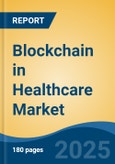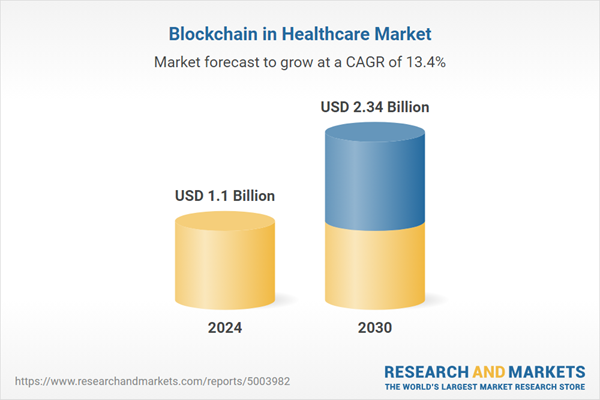Speak directly to the analyst to clarify any post sales queries you may have.
10% Free customizationThis report comes with 10% free customization, enabling you to add data that meets your specific business needs.
The timestamp ensures that the transaction data was present at the time of block publication, enabling it to be hashed. By virtue of each block containing information about its predecessor, they form a chain, with each new block reinforcing the preceding ones. Consequently, blockchains are resistant to data tampering, as altering the data in any one block retroactively would impact all subsequent blocks. Private and public blockchains represent the primary types, although variations such as Consortium and Hybrid blockchains exist.
Blockchain technology is a novel tool that is revolutionizing various sectors, including healthcare. Within the healthcare system, Blockchain networks are employed to securely store and exchange patient data between hospitals, diagnostic laboratories, pharmacies, and physicians. In the medical field, blockchain applications have the potential to precisely identify critical and potentially harmful errors. As a result, it can significantly enhance the performance, security, and transparency of medical data sharing within the healthcare system.
By leveraging this technology, medical institutions can gain valuable insights and improve the analysis of medical records. Further, approximately 80% of the medical studies fail to produce the desired results due to errors such as fraud, data falsification and trial misconduct. It is important to mention that more than 690 healthcare data breaches were reported between July 2021 and June 2022. As a result, the adoption of blockchain technology (also referred to as distributed ledger technology (DLT)), has emerged to be a promising approach.
Key Market Drivers
Rising Incidence of Healthcare Data Breaches
The healthcare industry has witnessed a significant increase in the number of data breaches in recent years. The advent of digital technologies has presented an opportunity to eliminate the reliance on third-party custodians, all while ensuring security and transparency. The utilization of blockchain technology to address specific challenges, such as the efficient exchange of data among healthcare providers, directly impacts accurate diagnosis, appropriate treatment, and the overall ability of healthcare providers to deliver cost-effective care. The increasing requirements for medical data storage and security present numerous benefits for medical staff, patients, and healthcare facilities. Utilizing blockchain technology, with its cross-checking, encryption, and decentralization capabilities, enhances the security of medical data, thus driving market growth. Governments of various nations are prioritizing the digitization of the healthcare system and related sectors, recognizing its potential to enhance patient participation, improve health outcomes, and enable better forecasts, among other advantages.Key Market Challenges
Lack of Operation Knowledge
In terms of managing records, there is significant variation among healthcare physician providers and insurance payers. Encouraging all these organizations to adopt blockchain technology without a streamlined approach, such as a single payer system, poses considerable challenges. However, the effectiveness of the entire system is compromised if any organization is unwilling to embrace it. Convincing them to transition from paper records to electronic healthcare records (EHR) using blockchain is indeed a formidable task. Healthcare is a heavily regulated industry, with laws like HIPAA (Health Insurance Portability and Accountability Act) in the United States and similar regulations in other countries. Lack of knowledge about how blockchain can align with these regulations can lead to compliance issues and legal challenges.Key Market Trends
Rising Requirement to Store and Safeguard Medical Data
The requirements for medical data storage and security have witnessed a significant increase, offering numerous benefits to medical staff, patients, and healthcare facilities. The utilization of blockchain technology, with its cross-checking, encryption, and decentralization capabilities, plays a pivotal role in ensuring the security of medical data, thereby fostering market growth. Governments of various nations are prioritizing the digitization of the healthcare system and related business sectors, recognizing its potential to enhance patient participation, improve health outcomes, and enable better forecasting, among other advantages.Key Market Players
- IBM Corporation
- Patientory Inc.
- iSolve Technologies Private Limited
- Solve.Care Foundation OÜ
- Oracle Corporation
- Change Healthcare
- BurstIQ, LLC
- Medicalchain SA
- Guardtime
- Blockpharma
Report Scope:
In this report, the Global Blockchain in Healthcare Market has been segmented into the following categories, in addition to the industry trends which have also been detailed below:Blockchain in Healthcare Market, By Type:
- Public
- Private
Blockchain in Healthcare Market, By Application:
- Supply Chain Management
- Data Exchange and Interoperability
- Claims Adjudication and Billing
- Others
Blockchain in Healthcare Market, By End User:
- Pharmaceutical and Medical Device Companies
- Healthcare Payers
- Healthcare Providers
Blockchain in Healthcare Market, By Region:
- North America
- United States
- Canada
- Mexico
- Europe
- France
- United Kingdom
- Italy
- Germany
- Spain
- Asia-Pacific
- China
- India
- Japan
- Australia
- South Korea
- South America
- Brazil
- Argentina
- Colombia
- Middle East & Africa
- South Africa
- Saudi Arabia
- UAE
Competitive Landscape
Company Profiles: Detailed analysis of the major companies present in the Global Blockchain in Healthcare Market.Available Customizations:
With the given market data, the publisher offers customizations according to a company's specific needs. The following customization options are available for the report.Company Information
- Detailed analysis and profiling of additional market players (up to five).
This product will be delivered within 1-3 business days.
Table of Contents
Companies Mentioned
- IBM Corporation
- Patientory Inc.
- iSolve Technologies Private Limited
- Solve.Care Foundation OÜ
- Oracle Corporation
- Change Healthcare
- BurstIQ, LLC
- Medicalchain SA
- Guardtime
- Blockpharma
Table Information
| Report Attribute | Details |
|---|---|
| No. of Pages | 180 |
| Published | August 2025 |
| Forecast Period | 2024 - 2030 |
| Estimated Market Value ( USD | $ 1.1 Billion |
| Forecasted Market Value ( USD | $ 2.34 Billion |
| Compound Annual Growth Rate | 13.4% |
| Regions Covered | Global |
| No. of Companies Mentioned | 10 |









